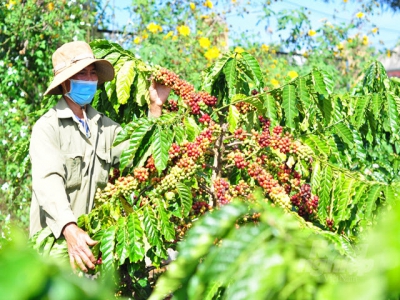The VnSAT programme efficiently boosts coffee production

VnSAT has aided cooperatives and cooperative groups in implementing coffee production processes in a systematic and highly successful manner via a variety of supporting initiatives.
Support activities of the VnSAT project help cooperatives and cooperative groups to produce coffee with high efficiency. Photo: M.H.
The VnSAT project supported the establishment of a sustainable agricultural cooperative organization in Loc Ngai commune (Bao Lam district, Lam Dong province). At the moment, the group consists of 45 houses with a total coffee area of 113 hectares. The group provides continual updates on coffee growing knowledge, assisting members in producing coffee in a systematic and effective manner.
Mr. Do Dinh Tien, the cooperative group's head, said that prior conventional coffee production practices resulted in inconsistent output and quality. Additionally, plants in the garden grow in an irregular pattern. As a result of the VnSAT's training in agricultural processes such as fertilizing, irrigating, and trimming, individuals now understand how to produce effectively.
"Knowledge of coffee production is really beneficial and yields excellent outcomes. We expect that the VnSAT project would contribute to the expansion of roads and other infrastructure necessary for increased production in the future "Mr. Do Dinh Tien trusted in Mr. Do Dinh Tien.
Similarly, the Nam Trung sustainable coffee cooperative group in Nam Ha commune, Lam Ha district, Lam Dong province, has been qualified to receive financing from the VnSAT project for infrastructure and water-saving irrigation technologies. Mr. Ta Quang Viet, the organization's chairman, said that the group consists of over 100 individuals with a combined coffee area of over 355 ha. The VnSAT project assisted the group in constructing 2.6 kilometers of traffic road, 200 square meters of storage, and other water-saving irrigation techniques.
According to Mr. Ta Quang Viet, the project-supported coffee models thrived, generating 3.5-4 tons of kernels per hectare. Farmers get training on how to care for coffee, fertilize, and water carefully, enabling them to be proactive in output. Specifically, coffee farming's ideas and practices are evolving, enabling individuals to save time and money while enhancing production and product quality. Nam Trung Sustainable Coffee Cooperative Group is now experimenting with organic coffee models in order to increase value.
Mr. Tran Van Xuat, Director of Nam Ban Agricultural Cooperative (Nam Ban town, Lam Ha district, Lam Dong province), said that the cooperative models supported by the VnSAT project had shown exceptional growth. Due of the high quality of the coffee produced by the pilot models, individuals from outside the project region also learn and follow.
"Our cooperative was eligible for VnSAT project assistance with warehouses, drying yards, sustainable coffee models, and, in particular, assistance with affordable irrigation models," Mr. Xuat said. In the past, irrigation required a great deal of time and money, but today, individuals may save money, time, and water by using a sprinkler irrigation system at the root, or drip irrigation. Fertilization is also accomplished through the irrigation system, which is quite beneficial.
"The models profit twice as much as they did before. More significantly, coffee output and quality improve. Currently, cooperative coffee models produce more than 4 tons of coffee per hectare "Mr. Tran Van Xuat, Director of Nam Ban Agricultural Cooperative, expressed this sentiment.
According to Lam Dong province's Department of Agriculture and Rural Development, the VnSAT initiative has benefited 44 farmer groups situated in the province's important coffee growing areas: Through the implementation of a cooperative/cooperative coffee production model, about 14,000 farmer families were helped through the process of sustainable coffee production.
The project assisted cooperatives and cooperative groups in producing coffee with capacity by providing a system of warehouses, drying yards, dryers, and pre-processing machines. These facilities assisted cooperatives and cooperative groups in completing the processing process on their own, thereby improving coffee quality.
According to Mr. Nguyen Van Chau, Deputy Director of the Lam Dong Department of Agriculture and Rural Development, cooperatives and cooperative groups have planned production systematically and developed value chains with the use of VnSAT. Farmers' mindsets have gradually shifted as a result of their exposure to the effectiveness of recommended technical procedures such as sparingly fertilizing, applying excessive amounts of chemical nitrogen fertilizers, and increasing organic fertilizer use... to minimize investment costs while ensuring plant growth.
"Farmers' understanding is expanding, and they are willing to apply new and more effective ones, boldly invest in cost-effective irrigation technology, dryers, and coffee pre-processing machines... to increase their investment efficiency and modernization in agriculture, in accordance with the province's coffee development direction and strategy," Mr. Nguyen Van Chau shared.
Related news
 Coffee replanting, the effectiveness of the VnSAT credit fund
Coffee replanting, the effectiveness of the VnSAT credit fund Without the assistance of the VnSAT project loan fund, many families find it difficult to spend a pile on coffee replanting.
 RoK, Japan look to boost agricultural exports to Vietnam
RoK, Japan look to boost agricultural exports to Vietnam The Republic of Korea (RoK) and Japan are eyeing bigger shares of Vietnam’s agricultural product and food market
 Organic agriculture still faces barriers
Organic agriculture still faces barriers Organic agriculture production and consumption in Việt Nam is facing many challenges from modest size, output and capital shortage to consumer